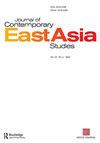The politics of grand strategy in an emerging state: a case study on Philippine diplomacy toward China
IF 1.4
Q1 AREA STUDIES
引用次数: 1
Abstract
ABSTRACT Some observers expected a drastic change in the Philippines’ diplomacy toward China when Rodrigo Duterte said goodbye to the United States in 2016. However, after six years, the Philippines has remained an allied partner of the United States. The Philippines’ defense establishment bolstered its maritime domain awareness capacity thanks to financial and technical support from the United States. Department of Foreign Affairs (DFA) maintained the award from the Permanent Court of Arbitration (PCA) favoring the Philippines over China. This paper sheds light on the Philippines’ policymaking process by framing the politics of grand strategy in an emerging state. The grand strategy is an intellectual architecture to clarify the general direction of foreign policy shaped by multiple state actors who are not limited by the foreign affairs office. Neither asymmetrical power relations nor presidential power can dominate the direction of the Philippines’ diplomacy. The president, the DFA, and the defense establishment have developed institutional foundations to craft particular policies. Once they designed the grand strategy in the 1990s, successive policymakers did not remove it but rather incrementally changed it, especially in the 2010s, when they faced a series of assertive actions from China. In an emerging state with limited state capacity, Filipino policymakers do not always coordinate well with each other but still maintain a certain level of autonomy to create particular policies. Against the dominant framework of the weak state, this paper argues that Filipino policymakers demonstrate the state’s capacity to achieve their policy goals, even with limitations.新兴国家的大战略政治:以菲律宾对华外交为例
摘要当罗德里戈·杜特尔特在2016年与美国告别时,一些观察家预计菲律宾的对华外交将发生巨大变化。然而,六年后,菲律宾仍然是美国的同盟伙伴。得益于美国的财政和技术支持,菲律宾国防机构增强了其海洋领域意识。外交部(DFA)维持了常设仲裁法院(PCA)的裁决,该裁决有利于菲律宾而非中国。本文通过构建一个新兴国家的大战略政治,揭示了菲律宾的政策制定过程。大战略是一个明确外交政策总体方向的智力架构,由不受外交事务办公室限制的多个国家行为者塑造。不对称的权力关系和总统权力都不能主导菲律宾外交的方向。总统、DFA和国防机构已经建立了制定特定政策的制度基础。一旦他们在20世纪90年代设计了这一大战略,历届政策制定者并没有取消它,而是逐步改变它,尤其是在2010年代,当他们面临中国的一系列强硬行动时。在一个国家能力有限的新兴国家,菲律宾政策制定者并不总是能很好地相互协调,但在制定特定政策时仍保持一定程度的自主权。在弱势国家的主导框架下,本文认为,菲律宾政策制定者展示了国家实现其政策目标的能力,即使存在局限性。
本文章由计算机程序翻译,如有差异,请以英文原文为准。
求助全文
约1分钟内获得全文
求助全文
来源期刊

Journal of Contemporary East Asia Studies
Social Sciences-Cultural Studies
CiteScore
2.50
自引率
0.00%
发文量
10
审稿时长
6 weeks
 求助内容:
求助内容: 应助结果提醒方式:
应助结果提醒方式:


